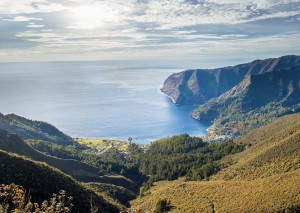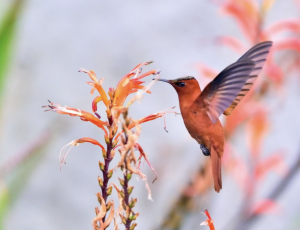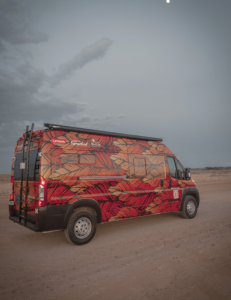Work from anywhere, and make a real difference giving back at the same time? No, it is not too good to be sure. Living a digital nomad life keeps getting better and better.
June 26th Lenovo announced its expanding its remote work initiative “Work for Humankind” to Raleigh North Carolina via a collaboration with nonprofit Birdlife International. The program, not limited to Lenovo employees selects qualified workers able and willing to work remotely, who are also seeking volunteer opportunities to give back doing something meaningful.
This is a follow up to the program’s launch in 2022 with a project on Robinson Crusoe Island, a small island near San Antonio Chile.

A 2021 global research report by Lenovo found that 90% of the survey respondents found that giving back to the community was vital to them when working remotely from anywhere. Their research revealed growing significance of remote and hybrid work for Gen Z and Millennials. In 2022 Lenovo implemented its first Work For HumanKind project. Lenovo evaluated and selected 16 participants to work remotely on Robinson Crusoe Island. At the same time participants were required to volunteer to make a difference addressing specific needs and goals of the local community and Conservation Island a local island-based nonprofit.
According to an article by freelance writer MarieLou Costa one of those participating was 34-year-old mother of two, Kay Bromley an IT specialist based in the UK. Other participants came from varying backgrounds and countries including sustainability analysts and strategists from Brazil and Germany and a research scientist from the United States.
Ms. Bromley was relocated to Robinson Crusoe Island by Lenovo. She continued working her regular job remotely, and collecting her salary, using a technology hub set up by Lenovo. She split her day between her job and volunteer work specified and guided by local community leaders and a local nonprofit, Island Conservation. She estimates she spent 40 % of her time on the island. And, through the collaboration and guidance from the local community, David Will of Island Conservation attests to real positive contributions made by Kay Bromley and the other participants.

To be sure the Lenovo program is very different from, and delivers far more legitimate positive local impact than what Nairobi-based Judy Kepher-Gona, founder of Sustainable Travel and Tourism Agenda refers to “voluntourism or tokenistic volunteer programs.” She was recently featured in a documentary on the dangers of over-tourism. In the documentary she warns of concerns regarding tourism gentrification. She explains, “Volunteerism benefits places if the need of hosts is identified in advance and matched with volunteers. Otherwise, it only satisfies the volunteer.”
Ms. Kepher-Gona goes further. To paraphrase, “I don’t see how one staff member staying for a few months can really have transformational impact unless they work within existing structures, institutions, policies and systems. Most volunteers don’t do this. They come with their minds made up and their own programs. They rarely make an effort to understand the context they are working. “
The Lenovo program is demonstrably different in that it ensures locals set goals, articulate priorities, expectations and measurable outcomes. The program is a “boots-on-the-ground” collaboration with locals and local nonprofits.

The 16 participants on the Robinson Crusoe Island project worked remote, and provided local volunteer services, for eight weeks. That length of stay was set by the Island community and Conservation Island. Prior to the participants of Work For Humankind, according to Conservation Island it would take locals 4 months to retrieve and input data from 70 cameras around the island. Work for Humankind reduced the time frame to weeks. And with direct hands-on help from the Work for Humankind participants the island and the nonprofit now have sufficient internet connectivity. Conservation Island’s Davis Will says, “ we have been able to implement consistent data collection and been able to develop manageable machine learning workflows. It has transformed how our team works. And, separately Ms. Bromley was able to use her skills to work with the local school on improving internet access and staff skills. She also created an app to allow locals to share important information.
In her reporting Ms. Costa quotes Emily Ketchen, Lenovo V.P. and Chief Marketing Officer, saying “There’s a growing global desire among knowledge workers across industries to work from anywhere, while doing good. Our research highlights the benefits of remote work that go beyond benefiting individuals in saving money and having a better work-life balance, as respondents also recognize the societal benefit.”

For Lenovo’s first North American project Work For Humankind in partnership with Birdlife International Lenovo has created a mobile tech lab and living space that will road trip through the U.S. and Canada. Lenovo describes the project as “birdlife meets vanlife.’ The project will collect birdsong data as a means of helping wildlife conservation efforts. The route for the 19-person team is based on specific designated important bird and biodiversity areas (IBAs). Their route will stop at refuges through South Carolina, Delaware, New York and Ontario. The van is a smart home designed to meet all of the volunteers’ living and work needs. Participants will work their regular day jobs remotely, via the van’s Lenovo tech hub. They will receive their regular pay.
According to Emily Ketchen of Lenovo, “Building off the success of Work For Humankind in South America, we were inspired to bring its mission to more parts of the globe.” And Gerald Youngblood, Lenovo’s CMO for North America says, “The van traveling North America will extend BirdLife International’s ability to capture and analyze birdsong data – showcasing how technology can be a force for good.”
